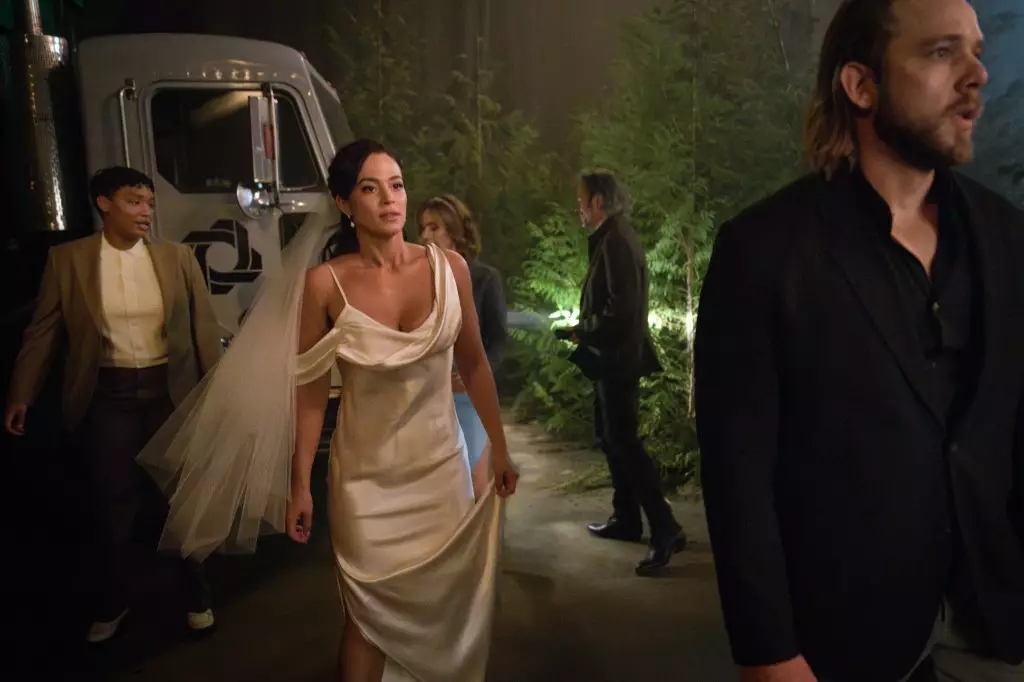The third season premiere of *Fire Country*, titled “What the Bride Said,” opened with an unforgettable twist that shattered the expectations surrounding a typical wedding episode. In this installment, we witness not just the celebration of Diego and Gabriela’s union but an unexpected crisis that forces the characters to confront their true selves and responsibilities. With a helicopter crashing through stained glass, the episode quickly transitions from festive vows to life-and-death drama, prompting an exploration of the show’s central themes of legacy and familial ties.
Sparking off the episode with an intense opening, the helicopter crash provides both literal and figurative turbulence. It shatters not only the beautiful setting but also the illusions of a perfect day. The urgency of the moment propels the characters—especially Gabriela, played by Stephanie Arcila—into action. Despite the ludicrousness of her saving lives in a wedding dress, the moment encapsulates the essence of *Fire Country*; it merges action with drama, sustaining viewer engagement through adrenaline-pumping scenes.
Showrunner Tia Napolitano reveals that the creative team aimed to transcend typical wedding tropes. While wedding mishaps are common in television, this event was designed to evolve the narrative rather than stick to predictable cliches. The idea for a helicopter crash not only raises the stakes but also juxtaposes the emotional intimacy of a wedding with the chaos of real-life emergencies.
A lingering tension is palpably felt in the relationships between characters, particularly between Manny, Gabriela’s father, and Bode. Napolitano expertly crafts the narrative to highlight Manny’s apprehension towards Bode—rooted in love yet complicated by fear. This dynamic is emblematic of the show’s deeper examination of familial legacies. Manny’s fears stem from his own experiences, suggesting that Gabriela’s involvement with Bode could lead her down a troubled path reminiscent of his own past. This nuance adds depth to the character arcs, driving home the show’s exploration of intergenerational relationships and their implications.
Moreover, while Gabriela takes charge amidst disaster, her actions may raise questions about her capabilities as a young adult. Is she truly equipped for the life she is choosing, both in love and career? The episode raises poignant questions about the role of personal choice, especially in moments of crisis, drawing viewers deeper into the emotional undercurrents threading through the narrative.
The decision to present this wedding episode as a two-part arc is not merely a strategic ploy to showcase impressive sets or dramatic visuals. Rather, it seeks to enhance character development and exploration of urgent themes. Napolitano’s mention of the elaborate sets signifies a commitment to immersing viewers in this intense world where emotional stakes are as high as physical dangers. The extended format allows for a slower exploration of the aftermath of the helicopter crash, ensuring that the characters’ reactions to the crisis reverberate throughout the season.
Additionally, this structure reinforces the gravity of the events unfolding. By extending the narrative, the creators can delve into the complexities of the characters’ relationships, grounding dramatic turmoil in rich emotional storytelling.
As the story unfolds, themes of legacy seem to permeate the dialogue. Bode’s journey toward reclaiming his identity as a firefighter and Leone family member marks a significant development. This season aims to explore not just Bode’s past but also the implications of his heritage—touching on how familial relationships shape individual paths.
New characters will add a fresh dynamic to the established storyline. The inclusion of Captain Casey, played by Jared Padalecki, hints at a possible expansion of the series universe. Padalecki’s chemistry with the cast promises to deliver engaging narratives that challenge Bode to embrace not only regulation but also his own adventurous spirit.
Napolitano’s assertion about collaborating with the writers for the forthcoming spinoff, *Sheriff Country*, suggests an interconnected narrative landscape that could deepen viewers’ engagement. The idea of sending “carrier pigeons” back and forth symbolizes a cohesive storytelling effort where every character’s journey is aligned, enriching the overall storyline while inviting viewers into broader thematic realms.
The premiere of *Fire Country* season 3 serves as a dramatic opening that cleverly intertwines action with deeply rooted emotional narratives. By inviting both chaos and introspection into a marriage ceremony, the series continues its exploration of character legacies, stability in relationships, and the impact of choices made under pressure. As the show moves forward, viewers can anticipate not just thrilling firefighting sequences, but poignant moments that highlight the complexities of love, responsibility, and the ties that bind families together.

